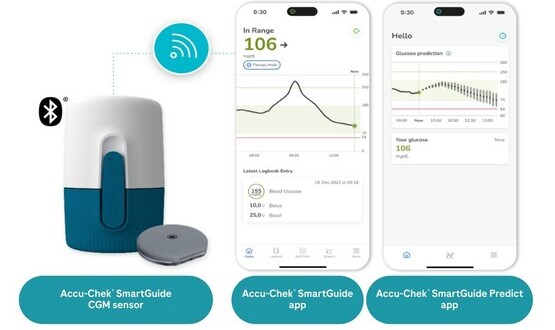Healum platform improves health outcomes for Type 2 diabetes patients

A randomised control study to explore the impact and efficacy of the Healum Collaborative Care planning Software and App on condition management for Type 2 diabetes (T2D) patients in NHS primary care has produced promising results that have been shown to improve health outcomes.
Healum CEO Jonathan Abraham and the study’s chief investigator Dr Adrian Heald, clinical lead for diabetes at Vernova CIC and consultant diabetologist at Salford Royal, spoke exclusively to Digital Health News about the purpose of the study and why it is unique, the results, and Healum’s next plans.
Healum, which has already played a big part in a diabetes project with last year’s You & Type 2, recognised key challenges facing primary care, where T2D prevalence is high, yet self-management is poor due to a gap in self-management support provided by healthcare professionals (HCPs). The company identified a need for a scalable way for multidisciplinary teams within primary care to provide relevant plans of care and support to patients.
Healum worked with Vernova Healthcare to evaluate the care planning software and accompanying patient-facing app in a real-world randomised control trial to determine the impact on lifestyle, behavioural and health outcomes for patients living with T2D.
“Essentially this was a fully funded randomised control trial, but it wasn’t instead of any particular intervention. Half of the people had their usual care delivered by practice nurses in a general practice setting, with approximately the other 50% of people using the app,” said Dr Heald.
The trial consisted of a control group made up of 100-150 patients with T2D, who received the usual standard of care. A separate treatment group, also including 100-150 patients, had access to the Healum app and received content from a HCP once per week through the app. They had visits and were checked for the same measures at zero and six months with a nurse or GP.
Results from the study showed that, on average, patients who used the digital care plans through the Healum app were able to lower their blood glucose levels (Hb1Ac) by an average of 7.37%, compared with an increase of 1.75% for the control group who received standard care over the 6 months.
In addition, patients that used the Healum app saw an improvement in quality of life measured by changes in the pre- to post-trial EQ VAS score of 8.2%.
Improving diabetes management
The Healum software enables teams of HCPs within the NHS to provide personalised care as well as motivate, monitor and support patients in managing their health in a way that is personal to them.
Through a seamless integration with EMIS Web, HCPs are able to quickly open a patient profile in Care Planning Healum, whilst extracting the necessary patient information and feeding information back into the patient record, as well as sharing information directly to the patient.
“A key point to say about this intervention is that it is compatible with nearly everybody’s smartphone, so it’s easily brought into the smartphone environment and unlike most digital solutions, the actual software was sitting within the secure environment for the GP system, Dr Heald added.
“People had regular prompts on a day-to-day basis in relation to things they had agreed to be doing… and what we’ve shown here is that the app is effective in terms of helping people to be able to make choices that are beneficial to them in terms of glucose level.”
Diabetes nurses and doctors involved in the trial were able to set goals and actions as part of a shared decision-making process with each patient, monitor patient progress and outcomes around the goals and intentions they had set, share relevant resources and services that support patients to adopt healthy lifestyle choices, and automatically update patients with their most recent test results from EMIS.
Using the Healum app had a positive impact on patients engaging in the management of their diabetes, the study found.
Patients in the study made 6,797 measurable healthy choices, completed 343 goals, read over 2,200 health education resources and tracked their health 2,430 times.
Healum CEO Abraham believes that the positive results from this trial are down to the unique way in which they have worked and collected the data.
He said: “We set ourselves up over a three-to-four-year period to deliver a randomised control trial and show that we’ve got statistically significant evidence over a large patient population. For a lot of companies in this space who are providing companion apps for different long-term conditions, in many cases they don’t go through that process.”
Abraham added that he was most surprised by the “very human statements that people put as their main health objective” such as cutting biryani out of their diet, wanting to be able to kneel down to pray, and wanting to be less sad and depressed all the time.
Next steps
The company’s next step is to create a peer real-time learning network for a real-world study. This will help those in the network view other examples around the country of what personalised strategies, including goals, actions, resources and services have worked for other patients.
It will also help practices learn which recommendations have generated the best health outcomes and view insights at the PCN or practice level.
The launch of a live learning network of primary care research sites is happening imminently, and practices can sign up to join.
“We did a randomised control trial, which is a very old-fashioned but important way of verifying that what we’ve got works,” Abraham said.
“Now we’re doing a real-world study, which just checks that it’s worth value for money. But in doing that real world study, we create the foundations. We’ve got contracts that opt-in these practices to our live learning network so that we can learn together.”



